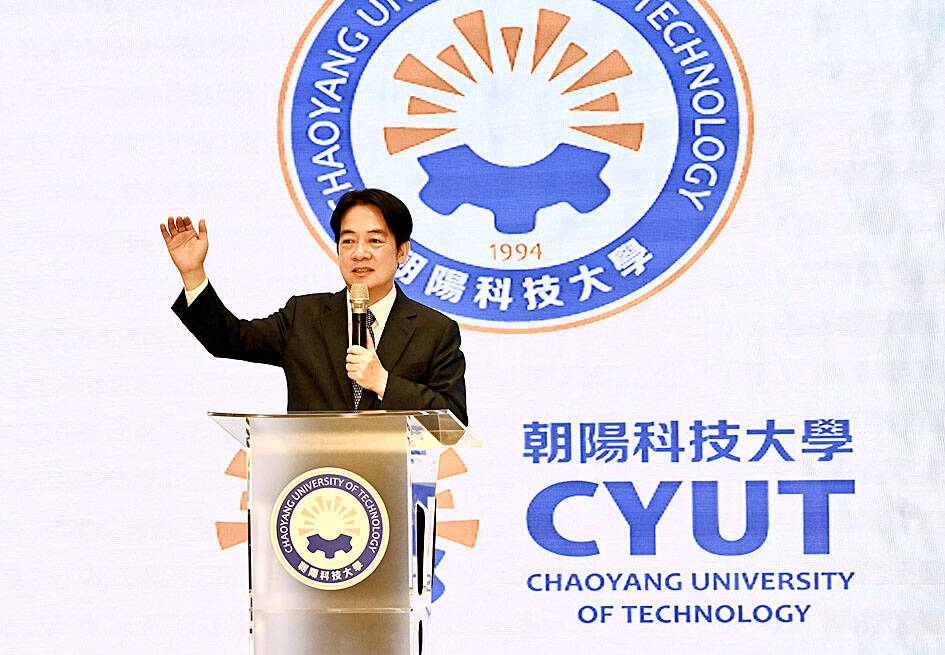The government is to subsidize students at private universities “at least half” of the gap between the tuition fees of public and private universities, which is estimated to be about NT$25,000 (US$809) per year, Vice President William Lai (賴清德) said yesterday.
Lai made the remarks when attending a flag-awarding ceremony at Chaoyang University of Technology’s summer volunteers camp in Taichung.
The average tuition fee at public universities is about NT$62,000 per year, while that of private universities is about NT$110,000 per year, which is a gap of about NT$50,000 per year, Ministry of Education Department of Higher Education Director-General Chu Chun-chang (朱俊彰) said.

Photo: Liao Yao-tung, Taipei Times
Although most economically disadvantaged students can receive financial aid for tuition fees, many still need to depend on student loans or part-time jobs to pay for daily expenses, which could affect their education, Chu said, adding that even if they study at public universities, some might still have a financial burden from their daily expenses.
The ministry would subsidize students at private universities by directly deducting the money from the total tuition fee when they pay for it at the beginning of each semester, substantially reducing their financial burden, he said.
The subsidies are to be implemented from the second semester of the 2023-2024 academic year, and approximately 473,000 students at private universities are expected to benefit from it, he added.
Adding existing tuition and miscellaneous fee exemptions and scholarships provided by various government agencies, a total of about 591,000 students at private universities would be eligible for a minimum of NT$25,000 deducted from their tuition and miscellaneous fees, Chu said.
Deputy Minister of Education Lio Mon-chi (劉孟奇) said the subsidy plan is an education policy, not an election campaign promise, and that it is expected to cost about NT$15 billion per year.
Executive Yuan spokesman Lin Tze-luen (林子倫) said the Cabinet supports and approved the policy of closing the gap between the tuition fees of public and private universities.
The Taiwan Youth Association for Democracy yesterday said the gap between tuition fees has often been discussed by students, so the association also agrees with the idea of a subsidy, as it would help ease the financial burden on university students.
The Union of Private School Educators yesterday also issued a statement to express its approval of the policy.
Union president Yu Jung-hui (尤榮輝) said the policy would serve as a morale booster to critically endangered private universities, and although it would not necessarily prevent them from being shut down, it would improve the universities’ competitiveness in recruiting new students and also provide fairer education opportunities for students from economically disadvantaged families.
However, the union said it hopes the policy is only the beginning of reforms, as there are many regulations that need to be amended.
The government should implement a forward-looking blueprint for the future of higher education at private schools, allowing them to become top universities, it said.
Additional reporting by Chen Chien-chih

SECURITY: As China is ‘reshaping’ Hong Kong’s population, Taiwan must raise the eligibility threshold for applications from Hong Kongers, Chiu Chui-cheng said When Hong Kong and Macau citizens apply for residency in Taiwan, it would be under a new category that includes a “national security observation period,” Mainland Affairs Council (MAC) Minister Chiu Chui-cheng (邱垂正) said yesterday. President William Lai (賴清德) on March 13 announced 17 strategies to counter China’s aggression toward Taiwan, including incorporating national security considerations into the review process for residency applications from Hong Kong and Macau citizens. The situation in Hong Kong is constantly changing, Chiu said to media yesterday on the sidelines of the Taipei Technology Run hosted by the Taipei Neihu Technology Park Development Association. With

CARROT AND STICK: While unrelenting in its military threats, China attracted nearly 40,000 Taiwanese to over 400 business events last year Nearly 40,000 Taiwanese last year joined industry events in China, such as conferences and trade fairs, supported by the Chinese government, a study showed yesterday, as Beijing ramps up a charm offensive toward Taipei alongside military pressure. China has long taken a carrot-and-stick approach to Taiwan, threatening it with the prospect of military action while reaching out to those it believes are amenable to Beijing’s point of view. Taiwanese security officials are wary of what they see as Beijing’s influence campaigns to sway public opinion after Taipei and Beijing gradually resumed travel links halted by the COVID-19 pandemic, but the scale of

A US Marine Corps regiment equipped with Naval Strike Missiles (NSM) is set to participate in the upcoming Balikatan 25 exercise in the Luzon Strait, marking the system’s first-ever deployment in the Philippines. US and Philippine officials have separately confirmed that the Navy Marine Expeditionary Ship Interdiction System (NMESIS) — the mobile launch platform for the Naval Strike Missile — would take part in the joint exercise. The missiles are being deployed to “a strategic first island chain chokepoint” in the waters between Taiwan proper and the Philippines, US-based Naval News reported. “The Luzon Strait and Bashi Channel represent a critical access

Pope Francis is be laid to rest on Saturday after lying in state for three days in St Peter’s Basilica, where the faithful are expected to flock to pay their respects to history’s first Latin American pontiff. The cardinals met yesterday in the Vatican’s synod hall to chart the next steps before a conclave begins to choose Francis’ successor, as condolences poured in from around the world. According to current norms, the conclave must begin between May 5 and 10. The cardinals set the funeral for Saturday at 10am in St Peter’s Square, to be celebrated by the dean of the College